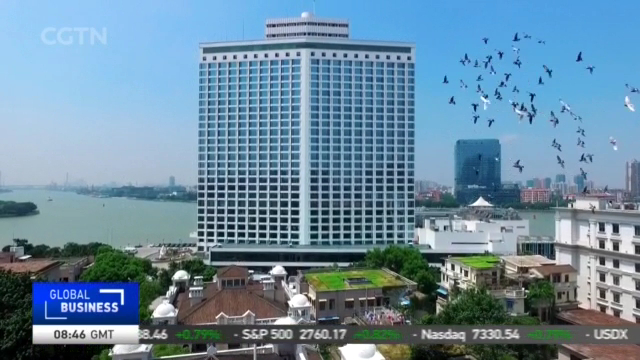
17:18, 03-Dec-2018
China's First Skyscraper: Iconic White Swan hotel symbolizes China's opening-up
Updated
16:27, 06-Dec-2018
06:23

China's First Skyscraper: Iconic White Swan hotel symbolizes China's opening-up
China's past 40 years have seen a country with no skyscrapers transform into a nation with the most in the world. And it all started in the southern city of Guangzhou with a riverside hotel known as the White Swan. Here's my colleague Zheng Junfeng's story, marking China's 40 years' of opening-up and reform.
Anyone passing Guangzhou's Pearl River, can't miss this beautiful gleaming building… the White Swan Hotel. The 34-floor structure sits on the shores of the historic Shamian Island, and next to many colonial-era buildings. The five-star hotel is an oasis of tranquility amid the hustle and bustle of China's trade hub. The building opened its doors in 1983 as the first 100-meter tall skyscraper in China.
The White Swan's story goes back 40 years to when China started its opening-up and reform. The architect of China’s opening-up and reform -- Deng Xiaoping -- decided in 1978 that China needed to build eight high-end hotels in its four largest cities.
Zhang Tian has been working in the hotel since it opened 35 years ago.
ZHANG TIAN, GENERAL MANAGER WHITE SWAN HOTEL "In the early stages of China's opening-up and reform, there were no proper hotels in the country. Foreign businessmen and overseas Chinese investors from Hong Kong, Taiwan, and Macao would find very limited high-end hotels to stay in. Some even had to travel to a nearby city just for a proper hotel room."
Hong Kong businessman Fok Ying-tung was the first to answer Deng's call for top-drawer hotels. His plan was to build a five-star hotel with 1,000 rooms to satisfy demand. Professor Shen Minghao from Guangdong University of Foreign Studies explained why then there was demand for such a big hotel in Guangzhou.
PROF. SHEN MINGHAO GUANGDONG UNIV. OF FOREIGN STUDIES "The Canton Fair started in 1957 in Guangzhou. By 1979, lots of foreigners came to the fair to do trade. So Guangzhou was often the first stop of many foreigners to China. The building of the White Swan Hotel not only provided accommodations but a clear announcement to the world that China's opening-up was serious and foreign guests were welcome."
Fok Ying-tung spared no effort in building his hotel. Fok decided to reclaim a section of the Pearl River and build the White Swan on it. Two Chinese architects designed the structure. And for a building so tall, engineers had to dig more than 100 meters deep into the rocks at the bottom of the river to create a solid foundation. Lots of building materials were also imported.
ZHANG TIAN, GENERAL MANAGER WHITE SWAN HOTEL "Mr. Fok Ying-tung loved the historic Shamian area. And being near a river means lots of fortune flowing in according to Chinese traditional culture. But at that time there was no land on Shamian for such a large hotel. So, he decided to reclaim land from the river. That was both difficult and expensive in the early 80s."
Fok Tsun-Ting is the eldest son of Fok Ying-tung and he witnessed the entire construction process by his father's side.
FOK TSUN-TING ELDEST SON OF FOK YING-TUNG "My father paid so much attention to the construction of the hotel. He visited the construction site lots of times and I was with him every time. I was moved to see him paying attention to every detail."
Fok Ying-tung's efforts were rewarded when the hotel opened on February 6th, 1983. Dozens of provincial and municipal officials and even some from the central government attended the grand opening. Thousands of Guangzhou citizens flocked to the White Swan as well to take a look at China's first international hotel. The hotel's inner garden, called "home town water", featuring rock works, a waterfall and pavilion, became a popular spot for photos.
FOK TSUN-TING ELDEST SON OF FOK YING-TUNG "The White Swan Hotel is not just a business. It's an iconic building for China's opening-up and reform. We wanted it to have a positive influence on society."
The White Swan has hosted many important guests from around the world, including Queen Elizabeth II, U.S. President George Bush, then Secretary of State Henry Kissinger and Cuban leader Fidel Castro. Famous business leaders including Bill Gates also were guests and of course, the very person who initiated the idea of building the hotel -- Deng Xiaoping. Deng enjoyed the White Swan and even took his family here twice.
PROF. SHEN MINGHAO GUANGDONG UNIV. OF FOREIGN STUDIES "After the White Swan Hotel, the Guangzhou China Hotel and the Garden Hotel also opened, making Guangzhou the city with the most five-star hotels in China in the early 80s. That proved Guangzhou's important role at the very front of China's opening-up and reform."
The White Swan remains an iconic structure after its recent renovation. It stands as an ideal hotel for foreign guests and domestic travellers and local citizens who enjoy its food and riverside scenery.
By 2018, 35 years after the White Swan was completed, China had the largest number of buildings rising above 150 meters in the world at 15-hundred. That's more than the number of skyscrapers in the United States, the UAE, Japan, and South Korea combined. Forty-eight of the buildings in China soar above 300 meters.
ZHENG JUNFENG CGTN GUANGZHOU "Over the past four decades, the rising skyline of the Chinese cities has symbolized the country's urbanization, renaissance, and increasing confidence. And China as a whole is a like building still under construction. The higher it gets, the bigger foundation it needs. And that foundation is serving the people. So the more opening-up and reform gets, the more it needs to serve the people. Zheng Junfeng, CGTN, Guangzhou."

SITEMAP
Copyright © 2018 CGTN. Beijing ICP prepared NO.16065310-3
Copyright © 2018 CGTN. Beijing ICP prepared NO.16065310-3